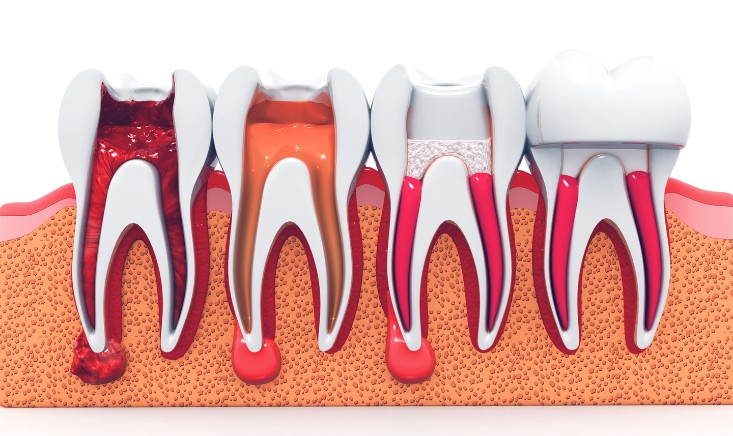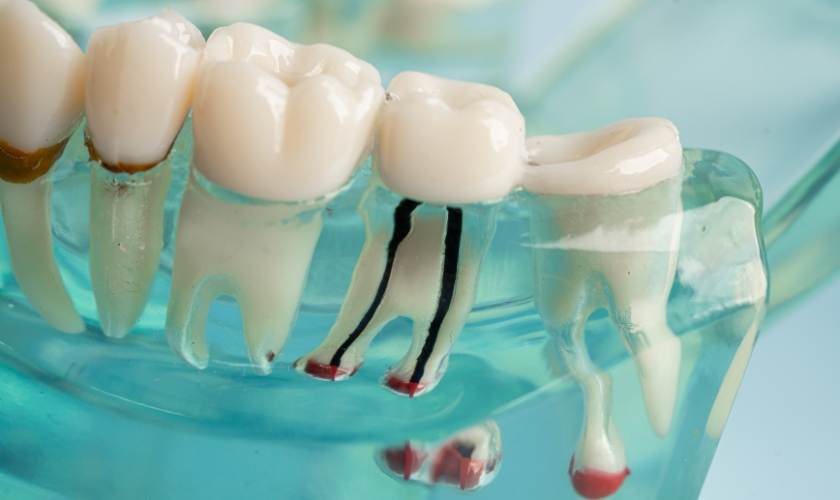We are not a registered Medicare/Medicaid Provider
How To Know If You Need Root Canal Treatment
Union, NJ
Root canal treatment, often called a “root canal,” is a common dental procedure that can save your tooth and relieve pain. Despite its reputation, a root canal is a straightforward and effective way to treat infected or damaged teeth. But how do you know if you need one? In this comprehensive guide, we’ll explore the signs that indicate you might need a root canal and what to expect from the procedure.
The Root Canal Treatment Procedure
Despite its reputation, a root canal is a straightforward and relatively painless procedure that can save your tooth and relieve your pain. Here’s what you can expect during the root canal treatment procedure:
Initial Examination: Your dentist will examine your tooth and may take X-rays to determine the extent of the infection or damage.
Anesthesia: Before the procedure begins, your dentist will numb the area around the affected tooth with local anesthesia to ensure you are comfortable throughout the procedure.
Isolation: A dental dam, a small sheet of rubber, is placed around the tooth to keep it dry and free of saliva during the procedure.
Pulpectomy: Your dentist will create a small opening in the crown of your tooth to access the infected or damaged pulp inside. The infected pulp is removed, and the root canals are cleaned and shaped to prepare them for filling.
Filling: Once the root canals are cleaned and shaped, they are filled with a biocompatible material called gutta-percha to seal them and prevent further infection.
Temporary Filling: After the root canals are filled, a temporary filling is placed in the opening of the tooth to protect it until a permanent restoration, such as a crown, can be placed.
Final Restoration: In most cases, a crown is placed on the tooth to restore its strength and appearance. The crown is typically placed during a separate appointment after the root canal treatment is complete.
Follow-Up: After the procedure, you may experience some discomfort or swelling, which can usually be managed with over-the-counter pain medication. It’s essential to follow your dentist’s instructions for post-operative care to ensure proper healing.
Signs You Need a Root Canal
Persistent Tooth Pain: If you’re experiencing severe or persistent tooth pain, it could be a sign of an infected tooth that requires root canal treatment. The pain may also radiate to other areas of the face or head.
Sensitivity to Hot and Cold: Sensitivity to hot or cold temperatures can indicate nerve damage or infection within the tooth. You may also experience sensitivity to sweet foods or drinks.
Swollen Gums: Swelling around the affected tooth, accompanied by tenderness or a pimple-like bump on the gums, can be a sign of an infection that has spread to the surrounding tissues. The gums may also appear red and inflamed.
Darkening of the Tooth: A tooth that has become discolored, especially if it has darkened significantly compared to the surrounding teeth, may indicate nerve damage or infection. The discoloration is often a result of the death of the tooth’s pulp tissue.
Prolonged Pain or Sensitivity After Dental Procedures: If you experience prolonged pain or sensitivity after a dental procedure, such as a filling or crown placement, it could indicate that the tooth’s nerve is damaged and a root canal is needed. This pain may worsen when you bite down.
Cracked or Damaged Tooth: A cracked or damaged tooth can allow bacteria to enter the inner layers of the tooth, leading to infection and the need for a root canal. You may experience pain when chewing or biting down.
Recurring Gum Boil: A recurring pimple-like swelling on the gums, known as a gum boil or dental abscess, can indicate an infection at the root of a tooth. This may be accompanied by pus drainage and a foul taste in the mouth.
Radiating Pain: Pain from an infected tooth can sometimes radiate to other areas of the face, jaw, or neck. This pain may be constant or intermittent and may worsen when lying down.
Loose Tooth: An infected tooth may become loose due to damage to the supporting bone. If left untreated, the tooth may eventually fall out or require extraction.
Benefits of Root Canal Procedure
The root canal procedure, despite its intimidating reputation, offers several important benefits for those suffering from infected or damaged teeth. Understanding these advantages can alleviate any concerns and encourage individuals to seek timely treatment. Here are the key benefits of a root canal procedure:
Pain Relief: One of the primary benefits of a root canal is the relief of pain associated with an infected or damaged tooth. The procedure removes the infected pulp, which is often the source of severe toothaches.
Preservation of Natural Tooth: A root canal allows you to keep your natural tooth, which is generally the best option for maintaining proper jaw function. Also, it avoids the need for more extensive treatments like dental implants or bridges.
Improved Oral Health: By removing the infected pulp and cleaning the root canals, a root canal can help prevent the spread of infection to other teeth or areas of the mouth. As a result, it promotes overall oral health.
Efficient Chewing: Restoring the health of the tooth through a root canal allows for efficient chewing, which can improve digestion and overall health.
Natural Appearance: After a root canal, the tooth can be restored with a crown or filling that matches the color and shape of your natural teeth, ensuring a seamless appearance.
Prevention of Jawbone Degeneration: Preserving the natural tooth through a root canal helps maintain the integrity of the jawbone, preventing bone loss that can occur when a tooth is extracted.
Cost-Effective: While the initial cost of a root canal may seem significant, it is often more cost-effective in the long run compared to tooth extraction, followed by the need for a dental implant or bridge.
Experiencing any of the signs indicating a potential need for a root canal can be distressing, but prompt action is crucial. Ignoring the symptoms of an infected tooth can lead to more severe pain, abscess formation, and even the loss of the tooth. Seeking timely dental care is essential to prevent these complications and preserve your oral health. Remember, a root canal is a routine procedure that can alleviate pain, save your teeth, and restore your oral health. Modern techniques and anesthesia make the procedure comfortable and relatively painless. Your dentist will guide you through the process and ensure you receive the care you need. Don’t hesitate to schedule an appointment if you’re experiencing symptoms of an infected tooth. Early intervention can prevent further damage and help you maintain a healthy, beautiful smile for years to come.
New Patients & Emergency Appointments Welcome!



